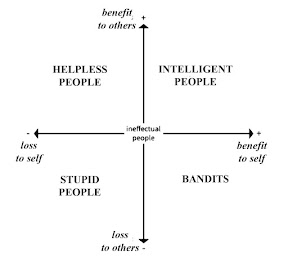 By
Madeleine Kando
By
Madeleine KandoYou cannot call someone stupid these days, or you could be arrested for political incorrectness. There are other alternatives, like calling someone an airhead, a bird brain, or a dumbass, but that might land you on the floor with a bloody nose.
Thanks to the incredible richness of the American language, however, there are safer ways to describe a stupid person (preferably without them being present): ‘He’s one fry short of a happy meal. ‘The light is on, but nobody’s home. ‘As bright as Alaska in December. ‘Goes surfing in Nebraska. ‘His belt doesn't go through all the loops. ‘His cheese has slipped off his cracker.’
Humor goes a long way, but it doesn’t change the fact that of all our human qualities, stupidity is the most abundant.
What is stupidity? Wikipedia’s definition is: ‘Stupidity is a lack of intelligence, understanding, reason, or wit. It may be innate, assumed or reactive’. Does that really explain why the world is full of stupid people and why non-stupid people do so many stupid things?
I was lucky enough (not smart enough) to come across an essay called: "The Basic Laws of Human Stupidity", written by Carlo Maria Cipolla, an Italian economic historian. This is what he has to say about stupidity:
THE FIRST BASIC LAW: Everyone always and inevitably underestimates the number of stupid individuals in circulation.
THE SECOND BASIC LAW: The probability that a certain person will be stupid is independent of any other characteristic of that person.*
THE THIRD BASIC LAW (The Golden Rule): A stupid person is a person who causes losses to others while deriving no gain to self and even possibly incurring losses.
Human beings fall into four basic categories: the Helpless, the Intelligent, the Bandit and the Stupid (See figure 1). If you suffer a loss while producing a gain to someone else, you are in field H: You act helplessly. If you make a gain while also creating a gain to others, you in area I: You act intelligently. If you gain something, but cause someone else a loss, you are in area B: you act as a bandit. If you do something that harms others and yourself, you fit in area S. You act stupidly.
Rational people have difficulty understanding irrational behavior. We can deal with a devious person’s motivation, or avoid being played for a patsy, but because you have to be smart enough to recognize how stupid you are, a stupid person will never realize that they are stupid. They will overestimate their own competence, knowledge etc.











